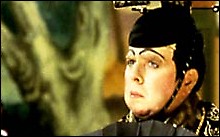![[Deep Focus]](../../flicker/logo.gif) |
|
|
TOPSY-TURVY | |
 |
GRADE: A- | Timothy Spall is The Mikado. |
|
I thought the first hour or so of this 160-minute backstage drama to be pretty flabby, actually -- I resigned myself to enjoying the performances and production design (there's lots to enjoy here) while keeping my ears pricked up for the precious nuggets of dialogue that characterize a Mike Leigh screenplay. Leigh's working method involves an elaborate quasi-improvisational collaboration with his performers, and here it creates a wholly inhabited late-19th century world that allows Jim Broadbent and Allan Corduner to slip impressively into their roles as the famous Gilbert and Sullivan words-and-music team renowned for their huge influence on the British musical theater. Once they start hashing out a new masterwork, Topsy-Turvy slips easily into gear. But the two of them spend the first section of the film mired in dissatisfaction after their latest production, which treads overly familiar territory for the duo, gets the cool critical reception that they know it deserves (in a bit of typically faint praise, Gilbert is named by one writer "the king of topsy-turvydom"). The problem may not be with Sullivan as much as with Gilbert, whose fanciful narratives have worn thin. Once Gilbert cluelessly comes up with a new been-there-done-that libretto, Sullivan declares that he can't set the thing to music and starts making remarks about writing a Gilbertless opera. Gilbert is obviously distraught, but remains proud and stubborn. Fortunately for him, his wife drags him against his will to a local exhibition of Japanese culture, including traditional fashions and kabuki theater -- which we see in an elaborate staging that underscores the similarities between British theater and its Far Eastern equivalent. The experience blasts the cobwebs out of his mind, and Gilbert begins work on a new production that's as brilliant as it is silly -- The Mikado. Comparisons have been drawn to Shakespeare in Love, and Topsy-Turvy is unquestionably the more sophisticated consideration of artistic inspiration and the creative process. I remain very fond of John Madden's highly entertaining film, which is several times more accessible than Leigh's but remains a light romantic comedy. Topsy-Turvy, on the other hand, aspires to be much more than that, with mostly gratifying results. The film owes its running time in part to Leigh's insistence on carving large pieces out of three G&S; productions (The Sorceror, Princess Ida, and of course The Mikado) and staging them on the movie screen as they may have appeared to audiences at the time. It's easy to argue that the clips -- particularly from the two former, lesser works -- could have been trimmed considerably, but I worry that would be missing the point. (In fact, I'd probably complain about their absence.) What does happen is remarkable in its own right. Our first glimpse of The Mikado, as it springs fully formed from Gilbert's imagination, looks alarmingly like a British/Asian version of a blackface minstrel show. As we follow the creative process, however, and see more of the work in context, it starts to seem like a good idea and, finally, a triumph. What's frustrating is that, other than the prodigious musical performances, Leigh doesn't put his expansive screen time to good use. Instead of getting whole stories, we get fragments of stories -- one member of the cast has a debilitating drug habit, another is a single mother; Sullivan travels the European continent and knocks up his mistress; Gilbert's father seems to be going mad. The hardships may be authentic, but their appearances on the screen seem a little rote and gratuitous without much in the way of followthrough. There may be a terrific six-hour TV miniseries version of this material waiting in the wings, but the theatrical version is somewhat unfocused. Over the long haul, Leigh does create a compelling story arc involving Gilbert's journey from sullen repetition to inspiration and finally to the persistent emotional comedown that seems to dog even his greatest efforts (with a poignant monologue from his quietly suffering wife creating an unsettling vacuum in the final reel). Still, the film's most perfect bits are the tiny behind-the-scenes vignettes that dominate its final hour, including glimpses of Gilbert rehearsing his actors (he corrects them as they mangle his playfully verbose dialogue) and Sullivan driving the orchestra to flawless excellence by good-naturedly yet firmly berating their cock-ups. Technically, the film is a marvel. For Leigh, this is fairly conventional stuff, but he directs with adroit precision, as though he were an old hand at the costume drama. Cinematographer Dick Pope makes the whole thing look three or four times as expensive as it really was, and costuming and art direction are lush and convincing. And as usual for a Leigh film, nearly every performer seems to have put both heart and soul into their role -- the ensemble is so stellar that it seems almost unfair to name names. But since that's what I'm supposed to do, I'll single out Broadbent, whose comic-tragic W.S. Gilbert is utterly convincing; Timothy Spall as Richard Temple, whose heartbreak when Gilbert decides to cut his big solo from the show is utterly palpable; and Shirley Henderson as Leonora Braham, the soprano whose assuredly coquettish stage presence is undercut by the unfathomable sadness in her eyes. Hers is emblematic of the pathos at the heart of this story -- Leigh's three-part coda dwells first on Gilbert, then on Sullivan, and finally on Leonora, who is beautiful, triumphant, and utterly alone at center stage.
| |
|
Directed by Mike Leigh Cinematography by Dick Pope Edited by Robin Sales Starring Jim Broadbent, Allan Corduner, Timothy Spall, Lesley Manville, and Shirley Henderson U.K., 1999 Theatrical aspect ratio: 1.85:1
| |

| |
 http://www.deep-focus.com/flicker/
bryant@deep-focus.com
http://www.deep-focus.com/flicker/
bryant@deep-focus.com